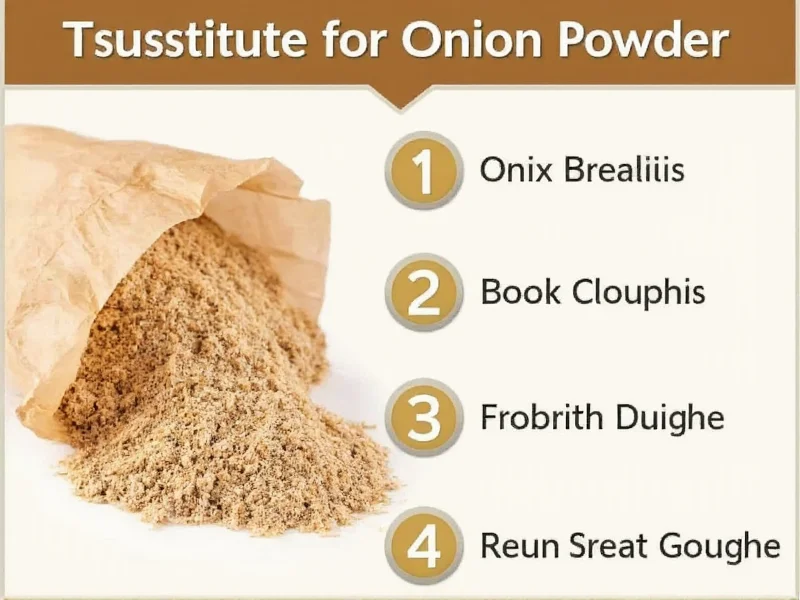The best substitutes for onion powder are fresh onions (use 1 tablespoon minced fresh onion per 1 teaspoon onion powder), onion salt (use 1:1 but reduce added salt elsewhere), or shallots (use 1:1 ratio). For immediate solutions, garlic powder works in a pinch (use half the amount), while onion flakes or granules can be reconstituted with water. Each substitute affects flavor intensity and moisture content differently, so choose based on your specific recipe requirements.
Running out of onion powder mid-recipe doesn't have to ruin your cooking plans. This versatile seasoning adds depth to countless dishes, from soups and stews to marinades and dry rubs. When you need an onion powder replacement, understanding your options ensures your dish maintains the intended flavor profile without compromising texture or consistency.
Why Onion Powder Matters in Cooking
Onion powder provides concentrated onion flavor without the moisture of fresh onions, making it ideal for dry rubs, spice blends, and recipes where excess liquid would be problematic. Its fine texture distributes evenly, and it has a longer shelf life than fresh alternatives. When substituting, consider both flavor intensity and moisture content to maintain your recipe's integrity.
Top 7 Substitutes for Onion Powder
1. Fresh Onions (Best Overall Substitute)
Fresh onions offer the closest flavor match but require adjustment for moisture content. White or yellow onions work best for general substitution.
- Conversion ratio: 1 tablespoon finely minced fresh onion = 1 teaspoon onion powder
- Best for: Sauces, soups, stews, and cooked dishes
- Tip: Sauté fresh onions first to mellow their raw flavor and evaporate excess moisture
2. Onion Salt (Convenient Alternative)
Onion salt combines onion flavor with sodium, making it useful when you need both elements. This substitute for onion powder works well in savory dishes but requires salt adjustment.
- Conversion ratio: 1:1 replacement, but reduce additional salt by 25%
- Best for: Meat rubs, seasoning blends, and dishes needing salt enhancement
- Caution: Not suitable for low-sodium diets without careful adjustment
3. Shallots (Delicate Flavor Option)
Shallots provide a milder, slightly sweeter alternative to onion powder. They work particularly well in French and Asian cuisines.
- Conversion ratio: 1:1 fresh shallot to onion powder
- Best for: Salad dressings, sauces, and delicate dishes
- Tip: Use minced raw shallots in cold applications or sauté for cooked dishes
4. Garlic Powder (Flavor Companion)
While not identical, garlic powder shares similar culinary properties and often appears alongside onion powder in seasoning blends.
- Conversion ratio: Use half the amount of garlic powder compared to onion powder
- Best for: Mediterranean dishes, meat seasonings, and when complementary flavor is acceptable
- Limitation: Creates a garlic-onion hybrid flavor rather than pure onion taste
5. Onion Flakes or Granules (Direct Conversion)
These dehydrated onion forms differ primarily in texture but offer identical flavor profiles to onion powder.
- Conversion ratio: 1:1 replacement, but reconstitute with 1 teaspoon water per tablespoon
- Best for: Any recipe calling for onion powder
- Preparation: Let reconstituted flakes sit for 5 minutes before using for best results
| Substitute | Ratio to Onion Powder | Best Recipe Types | Special Considerations |
|---|---|---|---|
| Fresh onions | 1 tbsp = 1 tsp | Soups, stews, sauces | Reduce liquid elsewhere; sauté first |
| Onion salt | 1:1 (adjust salt) | Rubs, seasoning blends | Reduce additional salt by 25% |
| Shallots | 1:1 | Dressings, delicate sauces | Milder, sweeter flavor profile |
| Garlic powder | 1/2 amount | Mediterranean dishes | Creates garlic-onion hybrid flavor |
| Onion flakes/granules | 1:1 (reconstitute) | All applications | Add 1 tsp water per tbsp substitute |
Special Dietary Considerations
When searching for a gluten-free onion powder alternative, all natural substitutes listed above are inherently gluten-free. For low-sodium diets, avoid onion salt and opt for fresh onions or homemade alternatives. Those following a keto diet can use any onion substitute without concern, as onion powder contains minimal carbohydrates.
When Substitutes Won't Work Well
Some applications truly require onion powder's specific properties. In dry spice rubs for meats, fresh onion substitutes add unwanted moisture that prevents proper searing. For commercial seasoning blends requiring precise measurements, substitutes may alter the intended flavor balance. In baking applications like savory biscuits or crackers, the moisture content of fresh alternatives can affect texture and rise.
Creating Your Own Onion Powder Substitute
When you need a quick homemade onion powder replacement, dehydrate fresh onions in a low oven (200°F/95°C) for 2-3 hours until completely dry, then grind in a spice grinder. This best substitute for onion powder in recipes maintains freshness and avoids preservatives found in commercial products. Store any excess in an airtight container for up to one month.
Recipe-Specific Substitution Tips
For chili recipes, fresh onions provide better texture and flavor depth than powder. When making meatloaf, onion salt enhances binding properties while adding flavor. In salad dressings, shallots create a more delicate flavor profile than standard onion powder. For baked goods like savory scones, onion flakes reconstituted with minimal water work best to maintain proper dough consistency.











 浙公网安备
33010002000092号
浙公网安备
33010002000092号 浙B2-20120091-4
浙B2-20120091-4